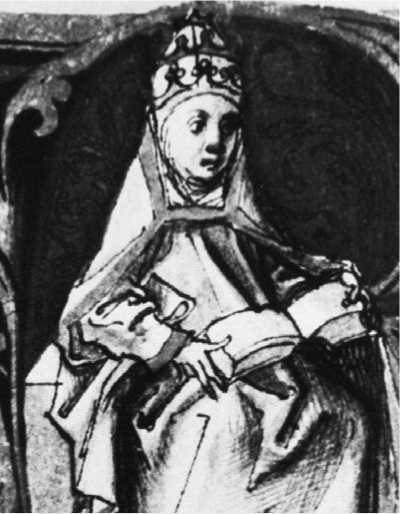With his sense of urgency concerning the end of the world, Gregory was able to marshal his weakened body to enormous feats of energy. He left behind some eight hundred letters, along with several books, and these attest to a highly complex, energetic man with an iron will. The people of Western Europe needed just such a figure to lead them.
It is thanks to Gregory that the pope became the leader of Western Christianity. In his time, a number of other bishops
Boniface VIII

If Gregory represented the beginnings of popes' great political power during the Middle Ages, Boniface VIII (BAHN-i-fus; c. 1235-1 303; ruled 1294-1303) seven centuries later symbolized the end of that power. Born Benedict Caetani (kah-ay-TAHN-ee), he was the son of wealthy parents in Anagni (ah-NAHN-yee), a town in central Italy. He studied law, but by the age of thirty had begun a career in the church as secretary to Cardinal Simon of Brie. When the latter became Pope Martin IV in 1281, he made Benedict a cardinal.
to gifts both by kings and a series of popes, Benedict became wealthy as well as powerful during his time as cardinal. Meanwhile a struggle raged between different political groups eager to win control of the papacy. It took them more than two years after the death of Nicholas IV in 1292 to choose a successor, and when they did it was a highly unlikely candidate: a her
Mit named Peter of Morrone, who became Pope Celestine V. Peter had no desire to be pope, and resigned after four months. Later, critics would charge that Benedict had urged the resignation; whatever the case, he now became pope as Boniface VIII.
Popes and kings had long been locked in a struggle for power, and Boniface set out to show his superiority over the kings of France and England by stating that his priests had no obligation to pay taxes to their governments. Boniface wanted the priests to pay taxes to him, just as all kings were supposed to pay taxes to the pope. The response was one of anger, particularly from King Philip IV of France, who refused to pay any taxes at all. Boniface backed down in 1297, saying that priests should make "gifts" to monarchs in times of emergency.
In 1301, Philip had a French bishop arrested for a variety of crimes, includ-
Vied with the bishop of Rome for supremacy. There was the bishop of Constantinople, whose office, renamed "patriarch," would become the leading position in the Greek Orthodox Church after the split with the Roman Catholic Church in 1054. There were also bishops in Jerusalem, the city where Jesus had walked; in Antioch, an early Christian stronghold in what is now Syria; and Alexandria, an Egyptian center of Greek culture.
Gregory, however, believed that there was a biblical basis for the bishop of Rome assuming leadership. Once again he tried to receive help from the emperor of the Eastern Roman Empire, or Byzantine Empire; but Emperor Maurice

Pope Boniface VIII. Reproduced by permission of the Library of Congress.
Ing treason, and asked Boniface to remove the man from his office. Boniface refused, and revoked all the privileges that the French king enjoyed in the way of influencing church affairs. Philip start-
Ed a smear campaign against Boniface, including charges that he had arranged the murder of Celestine V, who had died earlier. Boniface issued a decree called Unam Sanctum in which he stated that the pope held the keys to eternal salvation, and was therefore the leader of all Christian society.
Just how much power Boniface really had became apparent when Philip arranged to have him condemned by a number of French church leaders in 1 303, then sent soldiers to arrest the pope. Philip only imprisoned Boniface for two days, from September 7 to 9, but in those two days history was changed. Never again would popes rule as unquestioned leaders of Europe, and from that point on, the power of kings grew while the power of the papacy slowly faded. Boniface died five weeks later, on October 12, defeated and humiliated.
Turned a deaf ear to his requests that Maurice recognize his leadership in the church. Later, Maurice was murdered by one of his generals, but Gregory in the meantime had decided that he could lead the Christians of Italy with or without the help of the emperor.




 World History
World History









